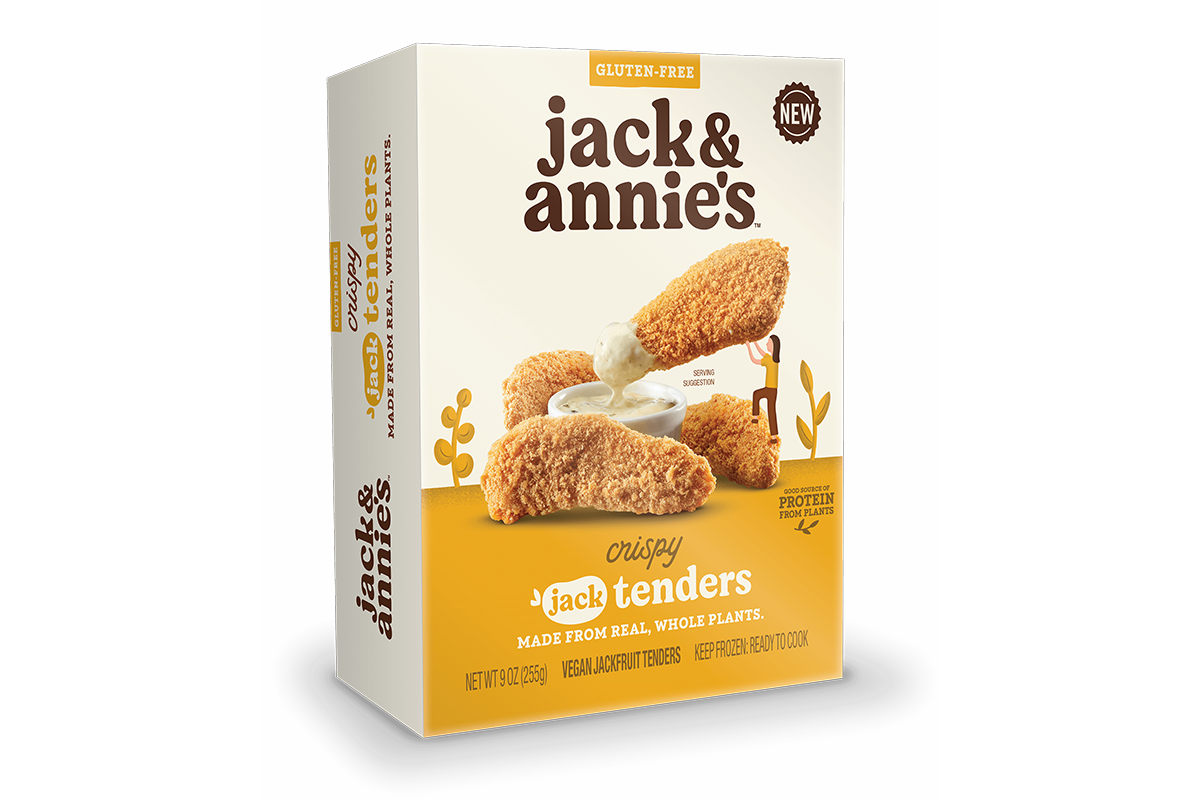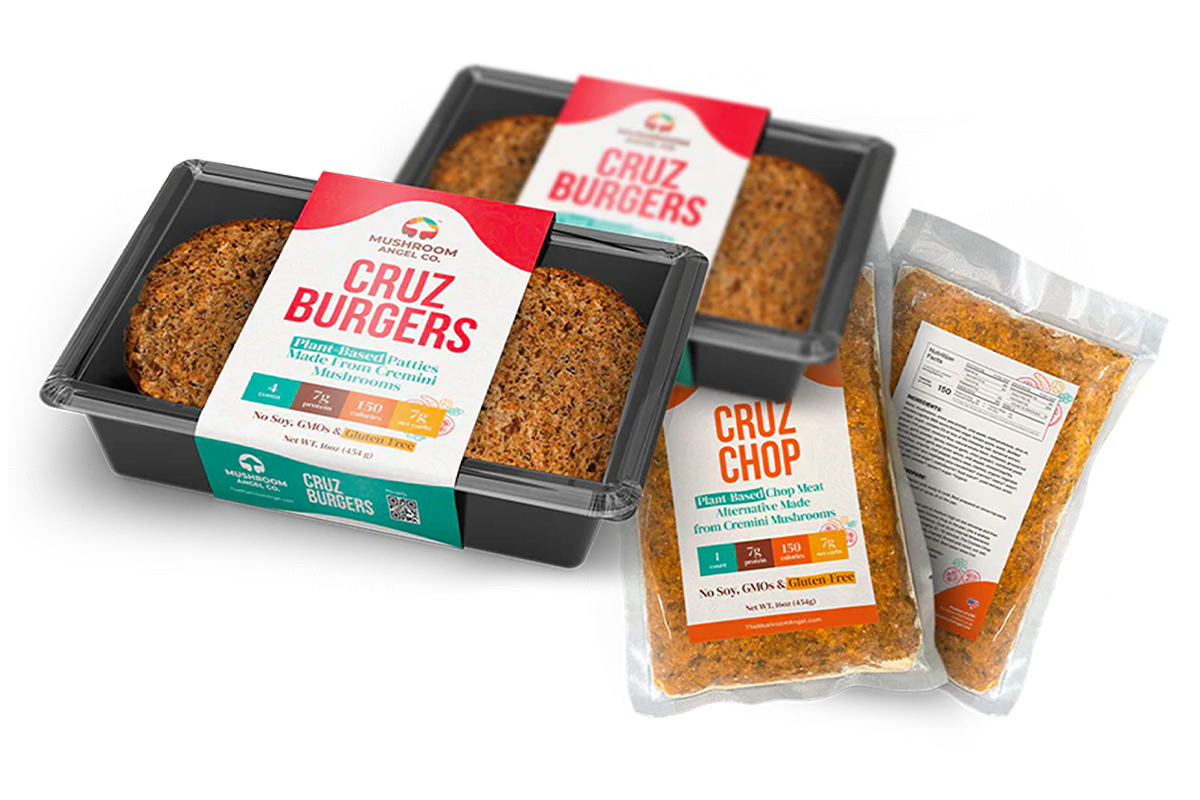Before Beyond Meat, Impossible Foods and all the other highly processed vegan products in the marketplace designed to simulate center-of-plate animal proteins, there were veggie burgers, bean patties and tofu. Today, innovators in this space are moving away from the overly manufactured products and focusing on the use of whole food ingredients, mainly vegetables, fungi/mushrooms and algae/kelp, all generically referred to as “plants,” and minimally processing them into familiar formats for use in foodservice and home kitchens.
It’s all about “making plants the star of the dish in order to eat less animal products,” said Ixta Belfrage, a United Kingdom-based cookbook author who spoke at the Culinary Institute of America’s Global Plant-Forward Culinary Summit, held in Napa Valley, Calif., April 18-20, 2023.
Keisha Griggs, an executive chef focused on Caribbean cuisine based in Houston, shared with attendees one of her favorite meat alternatives, jackfruit. This tropical tree fruit grows in Asia, Africa and South America and belongs to the same plant family as figs. The unripe jackfruit’s biggest claim to fame is its ability to imitate pulled barbecue pork and chicken, as it has a stringy texture and neutral flavor. Unlike animal sources of protein, jackfruit contains no saturated fats or cholesterol. It is much lower in protein than meat, but is loaded with potassium, fiber and antioxidants.
Jack & Annie’s, Boulder, Colo., has three new frozen foods made with jackfruit: Crispy Jack Patties, Buffalo Jack Patties and Crispy Gluten-Free Jack Tenders.
 Source: Jack & Annie's
Source: Jack & Annie's
“By using jackfruit as our number-one ingredient, we’re able to make foods that not only satisfy like meat, but that also are a good source of fiber and protein, lower in fat and calories than meat products, and simpler and less processed compared to other meat alternatives,” said Annie Ryu, founder and chief executive officer. “Jackfruit has a naturally meaty texture, and also picks up flavors well, allowing for a versatile and delicious tasting experience.”
Artichokes are also making their way into the alternate meat space. Cutting Vedge from World Finer Foods, Bloomfield, NJ, offers patties, balls, sausage and ground all based on artichokes. Artichokes have a hearty texture, serve as a carrier for different flavors and are a good source of antioxidants and other nutrients like iron, magnesium and vitamins C and B6.
“We are on a mission to transform the nutrient-rich artichoke into a new world of delicious food possibilities,” said Robert Levy, regional sales manager. “So, we partnered with chefs to curate real ingredients that deliver on taste, texture and protein. Artichokes star as the lead ingredient, supported by nutritious spinach, quinoa and bean protein. There are no fillers here. Veggies are the center of your plate.”
The mighty mushroom
Whole mushrooms are valued for their savory, umami flavor. They have a dense, fibrous texture that readily absorbs liquids, simulating a succulent cut of whole muscle meat.
Fable Food, an Australian startup that now sells its namesake products in the United States, has shiitake mushrooms as the number-one ingredient. Other key ingredients are coconut oil, soy protein isolate and tapioca flour.
The company was co-founded in 2019 by Jim Fuller, a fine-dining chef turned chemical engineer and mycologist (mushroom scientist). Fable’s first offerings were pulled pork, braised beef and beef brisket alternatives, as Fuller grew up in Texas eating slow-cooked meats and wanted to recreate the experience. In Canada, the brand now includes heat-and-eat meals, such as curry and teriyaki entrees.
The Mushroom Angel Co., Detroit, uses mushrooms to make its Cruz Burgers and Cruz Chops. They come seasoned and cook from frozen in under 10 minutes.
“We specialize in producing whole foods made from mushrooms,” said Wendy Ekua Da’Cruz, co-founder. “Our burgers and chops cut and bite like meat but taste like veggies. They have a wide range in cook – from rare to well-done. They are a good source of protein and fiber.”
Boulder, Colo.-based Meati Foods developed the Eat Meati line of whole-food proteins made from mycelium, the muscular root structure of mushrooms (fungi), the number-one ingredient. The products have comparable complete protein to meat with more fiber and no cholesterol. Currently products are only distributed to foodservice. They come in breaded chicken-style classic and crispy cutlets, classic steak-style filet and carne asada steak-style filet.
Meati has distanced itself from an ever-crowded category through its composition of at least 95% mycelium, according to Tyler Huggins, co-founder and CEO. One serving of the whole-cut meats naturally delivers as much as 17 grams of complete protein and 12 grams of dietary fiber, along with micronutrients such as 45% and 90% of the recommended daily intakes of zinc and vitamin B12.
The company opened an industrial-scale production facility in Thornton, Colo., in early 2023. Dubbed the “mega ranch,” the fully integrated, resource-efficient manufacturing operation is expected to cultivate Meati at an annual rate of tens of millions of pounds by late 2023, making it a producer of animal-free meat at a scale that will match and often exceed that of the United States’ largest individual animal-based ranches. Meati’s proprietary production process, coupled with its unique mushroom root, creates an infinitely scalable platform.
“Investors and consumers recognize that Meati is a new, differentiated food. They only need to read our simple ingredient list and taste Meati to recognize that this is the cut-through option people have been waiting for, something they absolutely see weekly if not daily on their plates,” Huggins said. “Our belief that nature already has the answer to many of today’s challenges allowed us to unlock a new food with Meati at a time when consumers are demanding something different and better.”
 The Mushroom Angel Co. uses mushrooms to make its Cruz Burgers and Cruz Chops. (Source: The Mushroom Angel Co.)
The Mushroom Angel Co. uses mushrooms to make its Cruz Burgers and Cruz Chops. (Source: The Mushroom Angel Co.)
Under the sea alts
Meat alternatives are also being made from foods made with sea-grown plants, such as algae and kelp. The protein in these products is complete and high quality. They are also a source of vitamins, minerals and other nutrients, including omega-three fatty acids.
“There’s an ocean of opportunities,” said Zoe Croft, director of sales, Atlantic Sea Farms, Portland, Maine.
Oceans are one of the most regenerative food systems on Earth, yet overlooked by many as being part of the food system. This is changing, as the sustainability messaging of the ocean as a food system has started to resonate with today’s consumers. This is fueling innovation in this space.
US-farmed kelp is an important part of that conversation. Kelp is a type of edible seaweed commonly associated with Chinese, Korean and Japanese cuisines, but the cooking traditions of Ireland, England and Wales, and Native American tribes on the Atlantic and Pacific coasts have also incorporated it into foodways for thousands of years, according to David Standridge, executive chef, The Shipwright’s Daughter, Mystic, Conn., who spoke at the CIA Plant-Forward Culinary Summit.
“Kelp is an easy ingredient to cook with. It can be frozen, thawed and refrozen without losing structure,” Standridge said. “It lends a meaty density to a dish when used in small amounts and is a flavor building tool that provides salinity and rich umami character in small doses.”
Atlantic Sea Farms is on a mission to locally mitigate the effects of climate change by introducing new and sustainable ways to grow regenerative kelp. It is often referred to as the “superhero of the ocean,” as it removes carbon from the atmosphere 20 times more efficiently than land crops, all while being low maintenance. It does not require fertilizer, pesticides, arable land or freshwater to grow.
Recently the company introduced Sea-Veggie Burgers in basil pesto and ginger sesame varieties. Kelp is the number-one ingredient in the vegan, gluten-free frozen patties, which also contain chickpeas and pea protein, among other ingredients.
Brooklyn, NY-based Akua is the producer of the world’s first kelp burger, which has ocean-farmed kelp as the number-one ingredient. Olive oil, cremini mushrooms, pea protein, black beans and quinoa are other key ingredients. Kelp and mushrooms bring umami to the burger, without any fishy taste, according to the company.
Sensory appeal
Triton Algae Innovations, a San Diego-based future food startup company now offers Too Good To Be Asian-style frozen dumplings with a cabbage, onion and alternative pork filling. The filling is enhanced with the company’s proprietary Hardtii algae, which the company said is the secret ingredient to making the vegan pork taste like the real thing.
Barcelona, Spain-based Cubiq Foods is a Spanish tech start-up established in 2019 that has developed ingredients that assist with flavor development in meat alts, along with improving hardness and texture. The company has a mission to improve the nutritional profiles of meat alternatives using sustainable, healthy ingredients.
One such offering is an emulsion of vegetable oil and water that is stabilized with vegan ingredients to replace the fatty component, which is often highly saturated coconut oil. The company said that the manufacturer can swap fat ingredients, and by doing so, will improve the fatty acid profile while also possibly reducing the product’s calories.
“Our improvements to nutrition and juiciness with healthier fats reduce dependence on scarce ingredients and meet sustainability goals in the food chain,” said Andrés Montefeltro, co-founder and CEO.
This vegetable oil emulsion contains between 40% and 50% water and has a melting point above 176 °F. It is said to behave like an animal fat in terms of visual appearance, bite and mouthfeel.
“While the alternative meat industry has been experiencing some challenges of late, we don’t believe this means investors and consumers are no longer excited about this sector,” said Xun Wang, president and CEO of Triton Algae. “Consumers want to see and experience new and innovative ingredients and related products rather than the more duplicative and non-differentiated meat analogue products that have come to dominate that market. We think consumer desire for alternative meat and seafood products remains strong; it is just incumbent on companies to fill that market with tasty, healthy and sustainable products that consumers seek and crave.”



